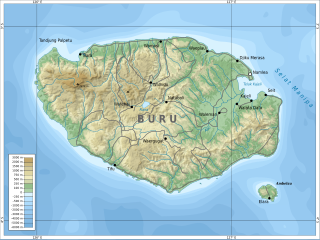
Buru is the third largest island within the Maluku Islands of Indonesia. It lies between the Banda Sea to the south and Seram Sea to the north, west of Ambon and Seram islands. The island belongs to Maluku province and includes the Buru and South Buru regencies. Their administrative centers, Namlea and Namrole, respectively, have ports and are the largest towns of the island, served by Namlea Airport and Namrole Airport respectively.

Pramoedya Ananta Toer, also nicknamed Pram, was an Indonesian novelist and writer. His works span the colonial period under Dutch rule, Indonesia's struggle for independence, its occupation by Japan during the Second World War, as well as the post-colonial authoritarian regimes of Sukarno and Suharto, and are infused with personal and national history.
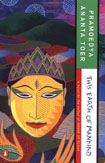
This Earth of Mankind is the first book in Pramoedya Ananta Toer's epic quartet called Buru Quartet, first published by Hasta Mitra in 1980. The story is set at the end of the Dutch colonial rule and was written while Pramoedya was imprisoned on the political island prison of Buru in eastern Indonesia. The story was first narrated verbally to Pramoedya's fellow prisoners in 1973 because he did not get permission to write. The story spread through all the inmates until 1975 when Pramoedya was finally granted permission to write the detailed story.

Raden Mas Soewardi Soerjaningrat ; from 1922 also known as Ki Hadjar Dewantara, which is also written as Ki Hajar Dewantoro to reflect its Javanese pronunciation, was a leading Indonesian independence movement activist, writer, columnist, politician, and pioneer of education for native Indonesians in Dutch colonial times. He founded the Taman Siswa school, an institution that provided education for indigenous commoners, which otherwise was limited to the Javanese aristocracy and the Dutch colonials.

The Indonesian National Awakening is a term for the period in the first half of the 20th century, during which people from many parts of the archipelago of Indonesia first began to develop a national consciousness as "Indonesians".
The Buru Quartet or Buru Tetralogy is a literary tetralogy written by Indonesian author Pramoedya Ananta Toer at Buru Island detention camp in Maluku. It is composed of the novels This Earth of Mankind, Child of All Nations, Footsteps, and House of Glass, published between 1980 and 1988. The book series is loosely based on the life of Tirto Adhi Soerjo.

Child of All Nations is the second book in Pramoedya Ananta Toer's epic quartet called Buru Quartet, first published by Hasta Mitra in 1980. Child of All Nations continues the story of the lives of the main character, Minke, and his mother in law, Nyai Ontosoroh. By describing the lives of these two people who live in the Dutch controlled islands of Java, Pramoedya is able to discuss many aspects of life in a colonized nation. Child of All Nations explores the social hierarchy in a colonized nation by giving glimpses of how the oppressed colonized peoples, such as the Javanese farmers, are required to be submissive to their occupiers, the Dutch. That wealthy, educated Javanese like Minke and Nyai were still considered inferior to the Dutch due to their Native birth status and frequently simply the color of their skin. The main theme of the novel is, as the title suggests, that the world is becoming more integrated as revealed in the life of the main character Minke, the self-proclaimed "child of all nations" 1. Minke speaks French, Dutch, Malay, and both high and low Javanese. He writes for a newspaper published in Dutch and has to come to terms with being a 'native' in a European controlled world. His worldview is jaded by the fact that he is wealthy and educated, and therefore closer to the Dutch than other Javanese; however, Minke comes to realize the ethical implications of the injustices being done to his people. His life is caught between two worlds, which the novel follows as he tries to understand who he really is, his role in the Dutch-occupied society, and his duty to his people.
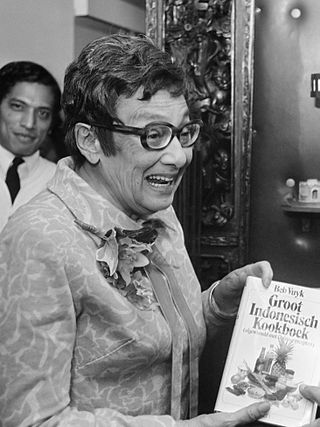
Elizabeth (Beb) Vuyk was a Dutch writer of Indo (Eurasian) descent. Her Indo father was born in the Dutch East Indies and had a mother from Madura, but was ‘repatriated’ to the Netherlands on a very young age. She married into a typically Calvinist Dutch family and lived in the port city of Rotterdam. Vuyk grew up in the Netherlands and went to her father’s land of birth in 1929 at the age of 24. 3 years later she married Fernand de Willigen, a native born Indo that worked in the oil and tea plantations throughout the Indies. They had 2 sons, both born in the Dutch East Indies.

Marco Kartodikromo, also known by his pen name Mas Marco, was an Indonesian journalist and writer.
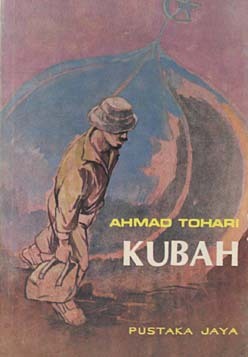
Kubah is an Indonesian novel written by Ahmad Tohari. It follows a poor man named Karman who becomes a member of the Indonesian Communist Party, only to find himself a victim of the ongoing political struggles in 1950s Indonesia. After the Party's destruction he spends twelve years as a prisoner at Buru before returning to his hometown and becoming a devout Muslim.

Tirto Adhi Soerjo was an Indonesian journalist known for his sharp criticism of the Dutch colonial government. Born to a noble Javanese family in Blora, Central Java, Tirto first studied to become a doctor but later focused on journalism. A freelancer since 1894, in 1902 he was made an editor of the Batavia based Pembrita Betawi. Tirto established his first newspaper in 1903 and, four years later, created Medan Prijaji as a medium for educated native Indonesians. This proved his longest-lived publication, lasting over five years before Tirto was exiled in 1912 to Bacan for his staunch anti-colonial criticism.
Si Tjonat is a likely lost 1929 bandit film from the Dutch East Indies directed by Nelson Wong and produced by Wong and Jo Eng Sek. Based on the novel by F.D.J. Pangemanann, the silent film followed an indigenous man who, having killed his fellow villager, flees to Batavia and becomes a bandit. After kidnapping an ethnic Chinese woman, he is defeated and brought to justice.
Frederick D. J. Pangemanann was a journalist and novelist from the Dutch East Indies.

Major TNI Johannes Abraham Dimara was an Indonesian National Hero from Papua.
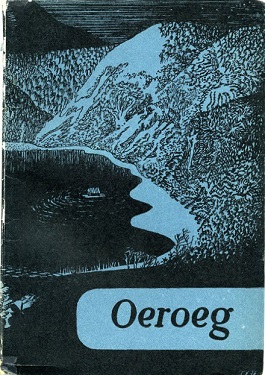
Oeroeg is the first novel by Hella Haasse. First published anonymously in 1948, it has become one of the best-known Dutch novels and a staple of literary education for many Dutch schoolchildren. The novel, a Bildungsroman, is set in the former Dutch East Indies : the anonymous narrator grows up on a plantation in the Dutch colony of West Java, his childhood friend is a native boy of the same age. As the narrator grows up, he finds himself becoming estranged from his friend, as a result of the political and racial circumstances of colonial life. After having served in the army during World War II, he returns to his native land, only to be told that it is not where he belongs, and that he must leave.

Footsteps is the third novel in the Buru Quartet tetralogy by the Indonesian author Pramoedya Ananta Toer. The tetralogy fictionalizes the life of Tirto Adhi Soerjo, an Indonesian nobleman and pioneering journalist. This installment covers the life of Minke – the first-person narrator and protagonist, based on Tirto Adhi Soerjo – after his move from Surabaya to Batavia, the capital of Dutch East Indies. The original Indonesian edition was published in 1985 and an English translation by Max Lane was published in 1990.
The Chinese in Indonesia, Indonesian: Hoakiau di Indonesia, is a book by Pramoedya Ananta Toer published in 1960 by Bintang Press. In the book, Toer criticized discriminatory policies imposed on Chinese Indonesians. The book is based on a series of articles published on the front page of Jakarta's biggest selling daily newspaper at the time: Bintang Timur, published by Hasyim Rahman.
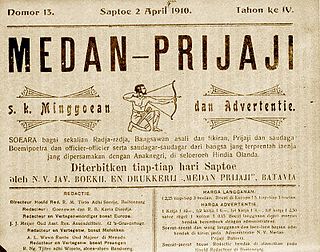
Medan Prijaji was a Malay-language newspaper in the Dutch East Indies founded and operated in Bandung by Tirto Adhi Soerjo between 1907 and 1912. Although it was short-lived, it was considered the first newspaper of the Indonesian National Awakening and inspired the creation of a number of other anti-colonial Malay newspapers. Tirto Adhi Soerjo's life was the basis for the Buru Quartet series of historical novels by Pramoedya Ananta Toer.

Johannes Latuharhary was an Indonesian politician and nationalist of Moluccan descent, who served as the first Indonesian governor of Maluku from 1945 until 1955, though he did not assume office in Maluku until 1950. A Protestant Christian, Latuharhary was an early proponent of Moluccan inclusion in the Indonesian state and he was an active participant in the struggle for Indonesia's independence.

Phoa Tjoen Hoat, who also published under the name Th. H. Phoa Sr., was a Chinese Indonesian, Malay language journalist, translator and newspaper editor active in the Dutch East Indies in the early twentieth century.















